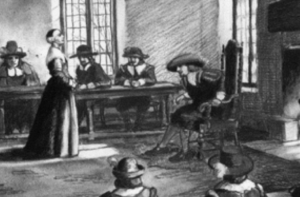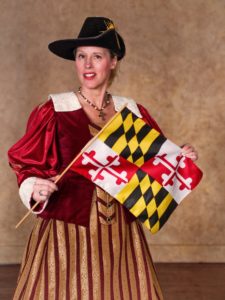This July, our Chautauqua living history series goes virtual as Maryland Humanities raises the voices of four notable women who took action to secure their right to vote. Communications Specialist Sarah Weissman spoke with Mary Ann Jung, the actor-scholar who plays Margaret Brent. Each Wednesday at 1:00 p.m., we will stream the performance and host a live Q&A with the performers starting at 2:00 p.m. The performance of Brent will be available July 6–12 and the stream and Q&A will occur Wednesday, July 8.
Margaret Brent, both the first female landowner and first female lawyer in America, demanded the right to vote nearly three hundred years before the Women’s Suffrage Act, when America still consisted of colonies. Brent (1601–1671), a resident of Saint Mary’s County in Maryland, “used her relationship to Lord Baltimore and his wife Lady Anne Arundel to accomplish things women after her time did not,” says Mary Ann Jung. Jung will portray Brent next week for Maryland Humanities’ Chautauqua living history series.

“It’s clear from the 1649 General Assembly letter to Lord Baltimore praising Margaret Brent that without Brent’s strong decisive actions after the Plundering Time (also known as Ingle’s Rebellion), there might not be any Maryland at all!” Historic Saint Mary’s City describes “Plundering Time” as “that period of conflict in early Maryland history from 1644-46 when the English Civil War spilled over into the New World. Protestants under Captain Richard Ingle took over St Mary’s City in the name of Parliament and destroyed the Catholic Chapel and many Catholics’ homes as well as either destroying or stealing livestock and goods of the Catholics who supported the Calverts,” she explains. “Margaret Brent had to hide with friends and her brother Giles and the Jesuit priest Father Andrew White were sent in chains back to England. It ended when Governor Leonard Calvert was able to recapture the colony using mercenary soldiers he’d hired in Virginia.”
When researching historic figures, Jung says she always started at her local library, especially since her research began prior to widespread internet access. “There was very little on Brent at that time other than a paragraph in a few Maryland history books,” Jung says. She also discovered Dr. Lois Green Carr’s article on Brent in the Maryland Archives

“So much has been lost from her story due to the political and religious conflicts of her time, which destroyed many early records of the colony. Nothing exists that belonged to her,” Jung says. “What I wouldn’t give for a diary or painting or description to turn up in somebody’s attic. Then we could better understand more about a fearless and formidable lady and why she did what she did.”
Jung reflects not only on what’s missing from Brent’s own story, but from early Maryland history as a whole. “It also saddens me that while the Maryland Colony started out with bright promise trying to be more kind and fair to Catholics, women, servants, and the Native people, that was all lost due to greed and hatred,” she says. “Slavery would grow instead of using indentured servants who could become free. The Catholics would again lose their rights, the Native people would lose their culture and languages, and women wouldn’t even think of pressing for legal equality until centuries later.”
Jung says how Brent raised and helped educate a Piscataway princess at the request of the girl’s father, Tayac [the Piscataway word meaning ‘Emperor’ or ‘ruler of all the chiefs] Kittamaquund. “I also loved learning that some Native tribes in our area had women chiefs, so I put that in the performance. I don’t think most of us know that, and I love surprising my audience,” she says. “When I met Mervin Savoy—the Tayac of the Piscataways—years ago, she told me they still hold Margaret Brent in high regard. According to their oral tradition, Margaret Brent continued to teach anyone how to read and write even when it became illegal to educate enslaved people or Native people.”
Jung also speaks about when why Brent deliberately broke laws. “She seemed to appreciate how important education was as a road to equality and a better life. Equality in education for everyone, especially during the pandemic, as well as freedom from police brutality is very much at the heart of today’s protests. I believe that Mistress Margaret Brent, like myself and so many of us, would be heartbroken and outraged that we are not further along the road to equality for all.”
Jung talks about breathing life back into the historic figure. “Her emotions are why I love doing a show and not a lecture about her,” she says. “Acting allows us to inhabit the character, whose feelings and emotions are universal. Who hasn’t felt frustrated and angry? Clearly Brent was when the Assembly turned down her right to vote. And although I have to guess at some other points what she was feeling since there are no records, it’s reasonable to assume she was proud of her education and accomplishments, sad when her friend Leonard Calvert died, and worried when it looked like the mutinous soldiers might take over St. Mary’s City. Worried enough to do something no woman had done before—demand the right to vote!”
***
Register for the Margaret Brent performance and Q&A
Disclaimer: The views and opinions expressed on our blog do not necessarily reflect the views or position of Maryland Humanities or our funders.

